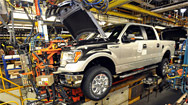Fuel
To reduce lifecycle greenhouse gas (GHG) emissions to the levels required for carbon dioxide (CO2) stabilization requires the development of fuels with lower fossil carbon content.1 Such fuels could then augment improvements in the fuel economy of our vehicles. In this section, we briefly discuss electrification and biofuels, two alternatives that Ford is currently implementing commercially. For more information on how Ford is developing and implementing alternatively fueled vehicles and powertrains, please see Sustainable Technologies and Alternative Fuels Plan.
Electrification
Electrification addresses both energy security and climate change concerns, because electricity can be made from a wide variety of fuels, including domestic sources and renewable energy.
Ford foresees a future that includes a variety of electrified and traditional vehicles, something we call “power of choice.” We are electrifying existing, traditional vehicle lines rather than creating unique electrified vehicle models. That way, our customers can choose from a variety of vehicle powertrains, including efficient gasoline engines, hybrid electric vehicles, plug-in hybrids and full battery electric vehicles. Our comprehensive electrification strategy touches all aspects of the electrification ownership experience, seeking to make it engaging, empowering and easy to live with.
Please see Electrification: A Closer Look for more on Ford’s approach to electrified vehicles. For more information on the hybrid electric, plug-in hybrid and battery electric vehicles we have launched or plan to launch, please see the Sustainable Technologies and Alternative Fuels Plan.
Biofuels
Biofuel use is expanding globally, with bioethanol made from corn, beets or sugar cane substituting for gasoline, and biodiesel derived from plant oils substituting for diesel fuel. In the U.S. in 2007, federal legislation expanded the Renewable Fuel Standard (RFS), mandating a significant increase in the use of biofuels by 2022.
While current corn-based bioethanol production in the U.S. is estimated to provide a modest (approximately 20 percent) reduction in vehicle GHG emissions on a well-to-wheels basis, next-generation biofuels such as lignocellulosic bioethanol could offer up to a 90 percent GHG reduction benefit.2 Building a substantial fleet of flexible-fuel vehicles (FFVs) provides a bridge to the widespread use of lower-carbon biofuels in the future.
Ford has a long history of developing vehicles that run on renewable biofuels. We produced the first flexible-fuel vehicle approximately 100 years ago: a Model T capable of running on gasoline or ethanol. We remain committed to biofuels as part of our sustainability strategy. In fact, the use of alternative fuels is a key piece of our blueprint for sustainability to reduce CO2. Consistent with consumer demand, Ford will continue to provide a range of products designed to run on a wide range of ethanol blends. FFVs provide fuel choice to consumers when the fuel is available and are necessary to transition to advanced alternative fuels.
For more information on our implementation of biofueled vehicles, please see Renewable Biofueled Vehicles. To learn about Ford’s perspective on biofuel-related public policy issues, please see Climate Change Policy and Partnerships.
- Of course, there is not only a need to reduce the fossil carbon content of the fuel itself, but to reduce any fossil-based CO2 emitted during feedstock excavation, fuel production and distribution.
- Ethanol: The Complete Lifecycle Picture, Office of Energy Efficiency and Renewable Energy, U.S. Department of Energy, March 2007.










